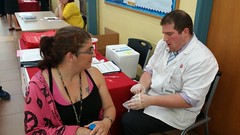Protect Yourself Against Fake Health Care Insurance Plans
Posted by Mitch Mitchell on Dec 4, 2019
CNN once did a news story on people who have been scammed by fake insurance plans. In these cases, people who were in dire health straits would look on the internet, find someone purporting to cover a certain area of the country, most probably the area where the people lived, signed up, started paying premiums, then when they finally had to go see a doctor came up empty. Not only no coverage, but no one had ever heard of them. Money gone, contract canceled, can't talk to anyone; you've just been scammed.
 via Compfight |
I'm particularly sensitive to health care, as, in my main career, I am a health care consultant in the financial area, and even once wrote my own idea for a health plan for America. I hate seeing people get ripped off, and I hate that people still don't seem to understand how to protect themselves when it comes to their financial needs concerning health care.
Not that I'm always perfect, even being in health care. I've actually messed up a couple of times myself, although not with health coverage specifically.
Some years ago I purchased vision insurance, thinking that it would help me cover the co-pays of my ophthalmologist's visits. When I presented it to the front desk, it turned out to truly be "vision" insurance, as in earning a discount when presented to certain places where you'd buy glasses.
If I thought that was disappointing, I found a way to top that soon afterwards when I purchased dental insurance... or so I thought. Trying to be smarter, I contacted my dentist to see what insurances they accepted. They named one that I was able to find online and that's what I purchased.
I was surprised by the low amount of coverage for the year, but since it matched what the dental office had said, I figured I was getting the right thing. Unfortunately, it turned out to be a plan where I would save 20% off the final total of any bills I incurred... which wasn't all that much at all when you realize how much dental bills can be.
This proves I'm not perfect at insurance across the board, but luckily health insurance is something I know pretty well. I can't take care of everyone immediately, because there are different plans all across the country, but I can offer some tips on how to protect yourself when you're looking for insurance, or dealing with insurance companies.
 |
First, no matter what insurance you have, whether you pay for it individually or belong to an insurance plan through your employer, your first step is always to contact your doctor, or the doctor you want to visit, to see if they accept your insurance, or participate with your insurance plan.
Both of those phrases mean the same thing. In essence, it means that they will bill your insurance for you and will accept payment coming directly from the insurance company. If they participate with the insurance company (which means they have a contract with them) then they'll write off any adjustments they've previously agreed to and only bill you for the amount agreed upon. You'll either owe a copay or a percentage of the original charge, but it's less than what you'd have owed without insurance.
Second, after you've checked with the doctor's office on participation, call the insurance company to find out whether you need an authorization for the services you need. Some insurance companies are sneaky like that; they say they cover something, then after you go to the doctor they say you were supposed to get an authorization up front. Although it's supposed to be the job of the people working for your doctor to do this for you, it's always best if you verify it beforehand since it could mean money coming out of your pocket.
Third, with "off brand" plans, make sure that what they're not telling you is that you have to pay your doctor, then send the bill to them for them to pay you. This isn't sneaky at all if they tell you up front, and it's more to help you defer the costs of your medical bills than actually totally covering you like traditional health care insurance.
Fourth, verify with the insurance company you sign up with that they participate with your physician. Get a list of names of physicians up front before you pay them a single cent.
If they say you have to sign up first, don't do it. If they say "all of them", don't do it. If they say "covered in full" for everything, don't do it. That's not how health insurance works. Finally, if you don't see your physician on the list but the physician said they were on the list, call the physician back to let them know.
Fifth, and the most important piece, read everything you receive. I mean it, from the first word down to the fine print, read absolutely everything! You can probably trust major carriers like Blue Cross more than smaller insurance companies, but their rules and what they cover are also more complicated.
Don't sign anything until you do my first recommendation, but read everything. Anyone they connect you with, read everything, get an understanding of how your medical claims are supposed to be processed, talk to your doctor, then decide how you want to proceed.
Health insurance can be a strange animal, but it's not that deep buying what you need. It's better to have the right coverage that you can afford to pay for that will give you peace of mind in case you need health care.
By the way, following my own rules above, I was able to purchase a much better dental plan that my dentist's office participates with that's saving me a lot of money. The health care coverage I have covers most of the costs of seeing my ophthalmologist also; whew!

